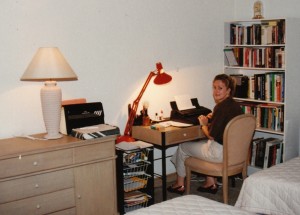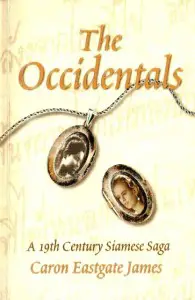 Caron Eastgate James (now Dann) is a journalist, novelist and researcher who lived in Thailand for four years in the 1990s, where she worked as a teacher and journalist, then researched and wrote her novel and, later, used that research as a starting point for her PhD thesis. She was born in Dunedin, New Zealand, in 1962, but now resides in Melbourne, Australia. Caron is the author of The Occidentals (Asia Books, 1999) and Imagining Siam: A Travellers’ Literary Guide to Thailand (Monash Asia Institute, 2008). In this interview she talks about her books, the literary scene in Thailand, and her passion for writing.
Caron Eastgate James (now Dann) is a journalist, novelist and researcher who lived in Thailand for four years in the 1990s, where she worked as a teacher and journalist, then researched and wrote her novel and, later, used that research as a starting point for her PhD thesis. She was born in Dunedin, New Zealand, in 1962, but now resides in Melbourne, Australia. Caron is the author of The Occidentals (Asia Books, 1999) and Imagining Siam: A Travellers’ Literary Guide to Thailand (Monash Asia Institute, 2008). In this interview she talks about her books, the literary scene in Thailand, and her passion for writing.
VMS: Your PhD research concentrated on Western writing about Thailand from Marco Polo to today. What were your conclusions?
CEJ: You’ll have to read my book, Imagining Siam! Basically, I say that there is a lot more to Thailand than the glossy tourism industry brochures show us, though there is all that too. I don’t think there’s anything wrong with package holidays to beautiful resorts at, for example, Phuket or Hua Hin. After all, the tourist dollar is very important to the Thai economy.
I would like English literature about Thailand to reflect the fact that there is much more to Thailand than the clichéd presentations of travel sections in newspapers, on screen and in popular novels. My message is probably more to writers – look wider than the girly-bar scene and the old East v West representations; and to publishers – commission manuscripts that tell a wider story. To readers, I would say look for diverse material about Thailand, particularly that written by Thai authors who write in English or whose works have been translated.
VMS: Although Imagining Siam: A Travellers’ Literary Guide to Thailand is an academic book, what benefits would a potential visitor to Thailand get from reading it?
CEJ: Travellers today are very savvy and many of them want more than just a resort package-holiday with cocktails round the pool. Literary tourism has become fashionable and popular. Middle-aged travellers, particularly, are interested in literary backgrounds to the countries they visit. I wrote Imagining Siam in an accessible way, so almost anyone could read it. People could use it to identify locations of books and films about Thailand. They might also read the book in conjunction with a trip to Thailand, to give themselves a better feel for what they’re looking at. Armchair travellers also like to read about travel, and this book is perfect for people who love books, travel and history combined. The montage on the cover is of some of the books that I own. I have about 300 books about Thailand, old and new, that I have collected over the last 20 years.
 VMS: What is your take on the English-language books about Thailand that are published nowadays?
VMS: What is your take on the English-language books about Thailand that are published nowadays?
CEJ: I think there is much more to be told. A lot of books since the 1970s have centred on the bar scene and male dreams of unlimited sex for sale, or the drug scene. This is only a tiny part of what Thailand is. There are few historic novels written about Thailand in English, particularly set before the 1960s. My editor said The Occidentals was the first historic novel Asia Books had published. In four years living in Thailand and more than 20 other visits, I went to Khao San Rd only once, and that was to go to a particular jazz bar.
In fiction, I like John Burdett’s series (Bangkok 8, Bangkok Tattoo and Bangkok Haunts), even though it does concentrate on that “seedy underbelly”. Also along those lines is the thriller Behind the Night Bazaar, by Angela Savage, set in Bangkok and Chiang Mai. For a different take on the Western man meets Eastern girl theme, I like Thai Girl, by Andrew Hicks, which tells the realistic tale of an Englishman who meets a Thai woman who works as a beach-side masseuse. The novel Jasmine Nights, by S P Somtow, is a wonderful coming-of-age story set in 1960s Bangkok. Siam or The Woman Who Shot a Man, by Lily Tuck, is also set in 1960s Bangkok, amongst the debate over the American part in the Vietnam War and the disappearance of the silk merchant Jim Thompson. For a novel about old Siam, The Falcon of Siam by Axel Aylwen, a best-seller in the 1990s, is a thrilling take on the story of the Greek, Phaulkon, who became a nobleman in 17th-century Ayutthaya.
There are also some terrific memoirs, for example: Dream of a Thousand Lives, by Karen Connelly, about a young Canadian exchange student’s time in Denchai, northern Thailand; and Meeting Faith: an Inward Odyssey, by Faith Adiele, about an African-American woman who becomes a maechi (Buddhist nun) in northern Thailand. For short stories, I like Fragile Days: Tales from Bangkok, by Tew Bunnag, and Sightseeing, by Rattawut Lapcharoensap. I have also read and enjoyed stories and novels by Kulap Saipradit (Sri Burapha), Pira Canning Sudham and Botan.
There are some wonderful cook books that also talk about Thai culture, particularly those by the Australian chef David Thompson, Thai Food and Thai Street Food. He has just opened a branch of his restaurant Nahm in Thailand, at the Metropolitan Bangkok hotel.
VMS: You have lived in quite a few places (New Zealand, Australia, England, the United States, Thailand) but the main inspiration in your writing comes from Thailand. What’s so special about Thailand?
CEJ: It seems everyone has written everything about NZ, Australia, England and the US. Thailand has so many fascinating stories, good and bad, to be told about Westerners who have travelled there. Plus, it’s the only other country I’ve lived in that has a culture completely different to that of my own. That’s not to say I wouldn’t write about those other places. I am planning to write a novel set in World War II Europe, for example.
VMS: When will you return to Thailand?
CEJ: As soon as I can! I don’t think it will be this year though. I’d like to bring my husband, as he hasn’t been to Bangkok. He called into Phuket briefly a few years ago when he was on a cruise.
VMS: You are a full time lecturer at Monash University in Melbourne. What courses do you teach?
CEJ: I’m not actually full-time necessarily. I’m either on short-term contracts or sessional contracts, as about 50% of academics are in Australia. I did have full-time contracts from the beginning of 2008 until June this year. This semester, I’m glad to be teaching only one day a week. I’m having a well-earned break so I have time to do some more writing.
The courses I teach are mainly media studies, because I spent a couple of decades as a journalist. Teaching media studies is a lot more theoretical than actually working as a journalist, though. I also teach professional and academic writing for the English section.
I have also taught at Monash College, the pathway institute to Monash University. Most of the people there are international students from China, Singapore, Japan, India, Sri Lanka, Indonesia and a few from Thailand. I taught media studies, academic writing and other arts units there.
VMS: In one way or another, you have been involved in writing almost all your adult life. Was the transition from journalism to fiction writing and to scientific research difficult? Are the skills of a journalist, a writer and an academic interrelated?
CEJ: I wrote all my childhood, too! Mum said I picked up a pencil when I was just a few months old, and she knew I would be a writer.
Although the three occupations of journalist, writer and academic cross over in some ways, they are all also quite different. All, however, require a large amount of independent work and initiative to get the job done. Journalists are good at thinking laterally to find information, and this has helped me in my research for both my historical writing and for my academic work.
Becoming an academic in 2008 was strange because, after being a senior journalist for a long time, I was suddenly a junior at work again! I was thrown into the deep end, lecturing, tutoring and co-coordinating a first-year media studies unit of 600 students at three campuses. I’ve learnt a lot since then and I think I’m improving all the time.
I’m lucky I enjoy working alone, because when I’m not teaching, I work in my home office. As a writer, I always quote the adages, “It won’t write itself” and “writing is about going into a room alone and doing it”! It’s not glamorous, or fun, or amusing. It’s a lot of hard work with little financial reward. I always feel lucky to have been published at all and for my novel to have sold well. About 99% of novels written are never published; of the 1% published, the vast majority make a loss. Because I’ve beaten both those odds, I believe anything could happen!
VMS: Apart from the Siamese saga trilogy, what other books do you plan to write?
CEJ: I have a thousand ideas! Well, the next two in The Occidentals saga, for a start. The third will take place from the end of World War II to today. As mentioned above, I am also writing a novelised biography of Louis Leonowens, son of Anna Leonowens. I have recently had a break-through in my research regarding Louis. I have also travelled to Tak and found the site of his house in the late 19th century and have been in touch with his grandson, also called Louis Leonowens.
I have several non-fiction books to write, but can’t say too much about them yet. They will be about Australian topics.
I’d also like to write a contemporary novel set in Australia, perhaps around the subject of modern families and the tendency for women to have babies later and later.
VMS: Thank you for your time. I’m looking forward to reading your next novels.
CEJ: Thank you for the interview. I’ll keep you posted on how they are going.
Voicu Mihnea Simandan
Bangkok, Thailand
August 4, 2010

